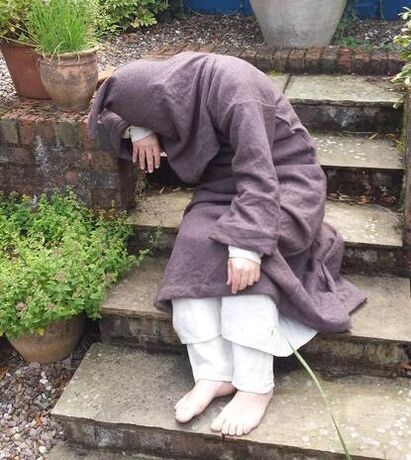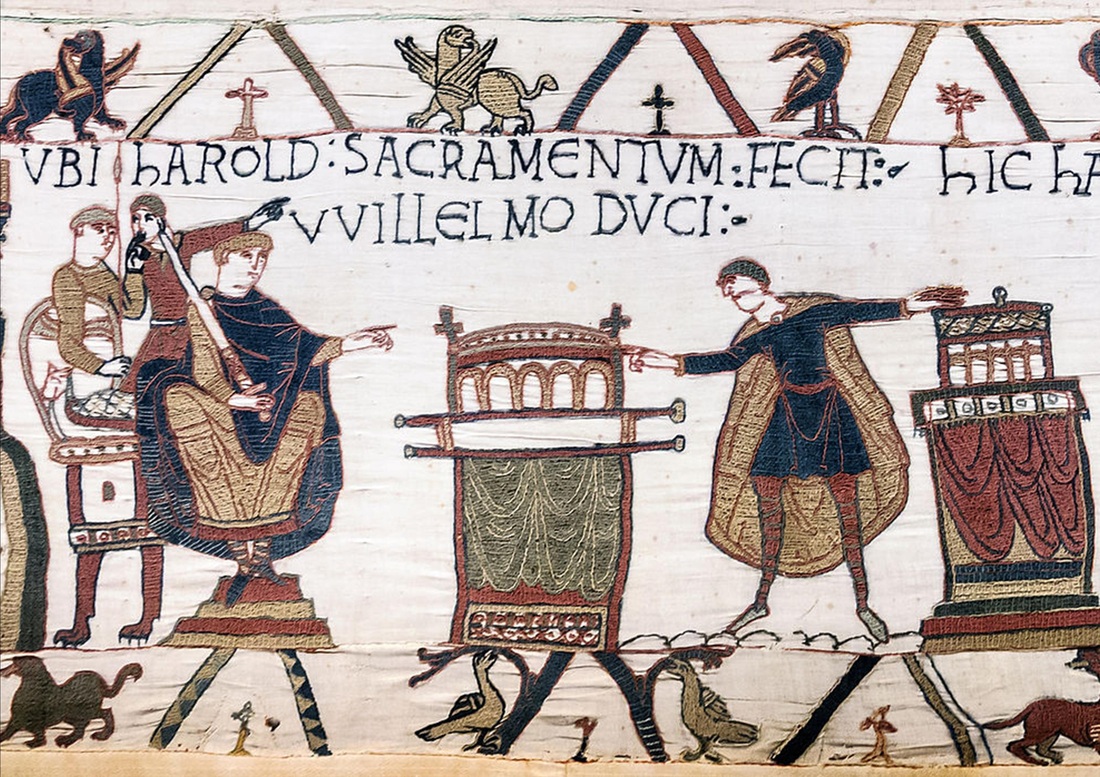|
31/12/2014 Medieval oaths: 5 things you should know before making those New Year's resolutionsRead NowWhether you're contemplating making a resolution, vow, promise, pledge, or even a sworn oath, the New Year awaits, and it's time to gird up your loins! With great vigour and vim, the Anglo-Saxon Monk tackles the fascinating subject of oath-making in early medieval England. After a week of frivolity and feasting, you, my blessed readers, may now be feeling just a tinge of guilt as well as a wave of melancholy bordering on moroseness. Somehow, though, urged on by that internal (and infernal) cycle of life, you may suddenly feel that you’re about to bolster your mind, stiffen your resolve and, indeed, gird up your loins. Promises to renew with verve your visits to the blessed gymnasium and even to forfeit mead for a month will follow, no doubt. But, beloved beholders of blogs, I feel obliged to ask you, as you clear away your emptied cups of mirth, if you truly know the value of an oath. Why do I ask? Well, in the medieval world, oaths were taken most seriously. They certainly were not reserved for dubious, after-the-party declarations of good intentions. So to help everyone appreciate the importance of vows and oaths, I’ve decided to take a look at five fascinating facts about oath-making in early medieval England. Now, I will just say that I can’t promise you that my medieval morsels will be at all relevant to your current post-pleasure predicament, though I will do my best to identify a few parallels here and there. You deserve nothing less. 1) Oaths were to be made in the name of the Lord God.
Hu se man sceal swerie, or ‘How one makes an oath’, is the title of an Anglo-Saxon law found in the twelfth-century legal encyclopaedia known as Textus Roffensis (‘The Text of Rochester’), which records English laws from as early as the year 600 right through to 1100. And here are a few of its suggested invocations, so repeat after me: “Upon the Lord, I am innocent, both in deeds and words, of the accusation of which [give someone’s name] accuses me.” “Upon the Lord, the oath which [say 'I' or give someone else’s name] swore is clean and without perjury.” “In Almighty God’s name, I was not aware of those things of which you now fully speak: there was no deceit – no weakness nor blemish – at the time I gave my oath to you, but it was both honest and pure without any deceit.” (My own translations/ paraphrases directly from the Textus Roffensis manuscript.) Lesson: OK, clearly these oaths are related to defending yourself (or your best buddy) from accusations of guilt. In fact, in the medieval period oaths were especially associated with cases at law. But, with a bit of anachronistic manipulation, I believe they may still have a bearing on your New Year’s resolution: First, make sure you invoke God in some appropriate manner. And, second, as the last of these oaths implies, just deny everything. And when you fail miserably to keep your pledge, just state to those who wish to know that you meant every word of it at the time. 2) It was better not to vow than to vow foolishly. In the penitential (a priest’s handbook of penance) known as Scriftboc we read: ‘If any man – or woman – should vow to keep their virginity, and afterwards are joined in a lawful sexual union (i.e. marriage), neither of them should forsake the union, lest they shall fast three years; because the foolish and impracticable vow will be broken.’ (My own translation: see Frantzen.) Lesson: OK, this is obviously a very particular type of oath or vow. It’s all about the stupidity of promising as a young man or woman that you will live a celibate life in a monastery (in Anglo-Saxon times, the word ‘nunnery’ was not used for female monasteries). Now we all know that statistically that just ain’t gonna happen, as my beloved American readers might put it. Now, I’m quite sure there are few out there, God bless you all, that are at this moment making an oath to join yours truly in the spiritual life, but by way of an overstretched analogy, it could be said that swearing to go into the gymnasium forever, whilst still nursing that fifth cup of mead, is likely to meet with a similar outcome. In other words, you’re as likely to suppress your natural bent towards physical indolence and luxuria as you are to suppress your libido. So take my advice: Don’t renew that gym subscription! 3) Not every person’s oath was of the same value. According to another law found in the Textus Roffensis, known as Be Mirciscan aðe (‘Concerning a Mercian oath’), the good folk of Mercia (now the Midlands region of England) had a way of ranking a man by the value of his oath. In other words, officially, in matters of law, one man’s oath was not necessarily treated the same as another’s: If you were a mass-priest (a priest who delivers the mass) or a thane (a bit of a high-flying landowner), then, yes, English-law reckoned your oaths to be of equal value. The man of God, you see, had God’s grace to help him up the social ladder, so to speak. However, if you were a low-class freeman – a ceorl (pronounced churl) – then you would need a further five fellow ceorls’ oaths to measure up to just one from the thane, or, to give him his other name, the ‘twelve-hindeman’ (his twelve ‘hinds’ is a measure of his pretty high rank). Or simply put: 1 thane’s oath = 6 ceorls’ oaths. Lesson: Now, then, what to say about this? Well, if you’re not especially high up in whatever social hierarchy you find yourself, you may need the support of five of your equally lowly friends to vow or pledge along with you, whether it be to go to that blessed gymnasium (you still haven’t given up on the idea, I know) or to stick to your dietary restriction programme, better known as fasting. Or, look at it another way, if you break your New Year’s resolution, just remind yourself that no one really expected you to stick to it, did they? After all, you’re neither the local politician nor minister, both of whom you know can always be trusted to keep their word. Well, maybe not the best comparison there. 4) You can depend on the oath of another to free you of guilt. Still with Textus Roffensis, let me summarise the tenth-century law-code known as Walreaf, that is, ‘Spoil of the slane’. Basically, this code, evidently written for the folk that lived in the Danelaw (the area in England where Danish culture prevailed after various Viking invasions), stipulated that it was a gross crime to rob corpses. In fact if you were proven guilty, you would be called a niðing (pronounced nithing), that is, an outlaw! Now this is where the oath-swearing comes in: if you were accused of corpse robbery, you needed to find 48 (yes, forty-eight) thanes to make a collective oath in order to declare your innocence. Lesson: Clearly, don’t get caught robbing your local cemetery. However, slightly more on topic, don’t get caught with your face covered in chocolate mousse as you clamber out of your fridge. If you do, it’s going to take an awful lot of high powered friends to convince your family that you have not forsaken your vow of fasting. By the way, historical point: we Anglo-Saxon monks don’t have refrigerators. Nor chocolate mousse. 5) Your oath could substitute for enduring a trial. Willelmes Cyninges Asetnysse (‘King William’s statute’) has to be my favourite post-Conquest law. By means of it, good old William the Conqueror introduced to the English the Norman idea of trial by combat. Generous enough to have it written down in English, not Latin, William outlines what was to be done when an Englishman and a Frenchman had a bit of a contretemps. Fascinatingly, if an accused Englishman refused to defend himself through either trial by combat or oath swearing, then he had the further option of ordeal by iron: carrying a piece of red-hot iron three long strides in order to prove his innocence (if innocent, after three days his burns would show signs of healing). Terribly civilized. Should the Englishman be the accuser, however, but he dared not summon the Frenchman to combat (what was William suggesting about the English, I wonder), then the Frenchman could defend himself by a comprehensive oath. No ordeal by hot iron for him, it would seem. Lesson: OK, I concede. I haven’t the foggiest how one might apply this to pledges or oaths of the New Year. You’ll just have to draw from it a more general point on life: Never, ever do anything silly like carry a bar of red-hot iron when an oath will do. Or better still, apply for French citizenship. Well, there you have it, my blessed readers. You are now fully equipped to understand the value of an oath, and if you can think of other ways of making any of the above apply to your own New Year’s resolutions, then you’re an even better logician than I am. By the way, I forgot to say, as I am an Anglo-Saxon, I actually get twelve days of Christmas, so by my calculations I can delay my resolution-cum-oath-making for a few more days yet. Well, there have to be some advantages to being a medieval monk.al A most blessed and Happy New Year to you all!
0 Comments
Your comment will be posted after it is approved.
Leave a Reply. |
Details
|


